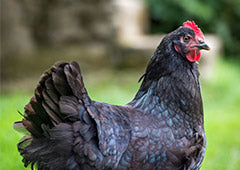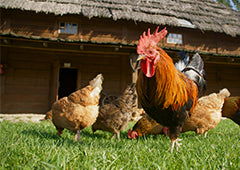Embarking on the wonderful experience of hatching baby chickens? While your eggs are turning and the embryos are growing, you should make yourself an egg-spert on everything to do with the first few days of a baby chickens life - they’re some of the most important they’ll ever egg-sperience!
Before they hatch...
Before the incubation calendar hits day 21, make sure you’ve ticked these tasks off your list. Otherwise, your baby chickens may be in some strife early on!
-
warm the brooder
By now, you should have your brooder all set up and the heat lamp warming up to the right temperature. This way, your chickens will have ideal living conditions right off the bat, instead of shivering whilst the heat lamp is warming up!
-
organise brooder bedding
The base of the brooder needs to be lined with bedding, so its easy to dispose of the baby chicken’s droppings. Also, it helps the baby chickens build up their leg strength.
For the first week or two, the you should put thick strips of paper towel down as bedding. Once the chickens have had a couple of weeks to built up their leg strength, change it to shreds.
-
organise your drinkers and feeders
Baby chickens should have their first meal prepared, served in a specially made baby chicken drinkers and feeders. You may be wondering why you can’t use an ordinary container - well, baby chickens are small, and can unfortunately fall into a container if it’s too large. This puts them at risk of drowning, and also illness from soiling their food. Baby chicken drinkers and feeders have small outlets to access the water and feed, so they can’t accidentally fall in.
Ok - so the babies have hatched (or are starting to) and the excitement begins! But what do we need to do now? Do we just let them be?
Don’t help them out of the shell when they hatch
It’s very, very tempting to help baby chickens hatch out of their shell. They look so helpless and worn out that we wish we could just break the shell ourselves! However, you definitely should not help your baby chicken hatch out of its eggshell, as many very important things take place that is crucial to their healthy development.
The baby chicken gets essential nutrients from eating parts of their eggshell, one of the reasons why you shouldn’t discard it straight away! Also, the struggle of breaking apart the eggshell strengthens the baby chicken’s muscles, which sets it up to have a healthy body. So however tempting it may feel, don’t help your baby chicken out of the shell - you’ll cause them a wealth of health problems in the future.
Wait for their feathers to fluff up before taking them out of the incubator
When your baby chickens hatch, their feathers might be looking a little damp. It might be tempting to move them into the warmth of the brooder, but you should not move the baby chickens until they’ve fluffed up. If you move them beforehand, they can catch a chill and become sick.
Don’t move any of them until they’ve all hatched
Baby chickens are marvellous little creatures. They actually cheer each other on, encouraging their brothers and sisters to hatch through cheeping! So if you’ve had one chicken hatch but it looks like more are on the way, don’t take them out! They’re actually helping more chickens hatch, through vocal moral support.
Encourage them to drink water
Within the first 24 hours of a baby chicken’s life, they should have their first drink of water. Remember - the baby chickens have only just hatched, and don’t really know how to do anything other than cheep and stumble around! So don’t be surprised if you put the waterer in the incubator and they do not know what it is or how to drink!
The baby chickens might need a little encouragement when learning how to drink. So if they haven’t got the hang of it by themselves, very gently dip their beaks into the water. They’ll soon get the idea!
Encourage them to eat feed
The same goes for feeding. The baby chickens might not know quite how to eat the delicious starter feed in front of them. Again, gently dipping their head into the feed will coax them to start eating.
Keep an eye on the heat lamp temperature
It’s very important that your brooder temperature is pretty close to the mark - baby chickens need their house to be toasty warm in their first few weeks of life. Keep an eye on the heat lamp temperature, it should be 37.5 degrees at LEAST for the first week. Decrease it by about 1 degree every week after that before your chickens are ready to face the temperatures of the outside world!
Change the bedding regularly
We mentioned earlier that you should use strips of paper towel as the bedding. It’s important for the health of your baby chickens that you change the bedding over regularly when it’s been soiled - you’ll see that it doesn’t take long to become dirty! Replace regularly with fresh clean strips of paper towel, and your baby chickens will stay healthy and growing well.
Organise their coop
If you’re going to continue to raise baby chickens until they’re fully grown, you’ll be amazed at how quickly they turn into adults. It usually only takes around 6 weeks until the babies are definitely not babies anymore! You’ll need to have a good quality chicken coop at the ready for them to make the move when they outgrow the brooder. Chickens don’t tolerate being squished very well! So whilst the chickens are growing rapidly, organise your Taj Mahal, Penthouse or Mansion - your baby chickens will outgrow the brooder faster than you think.
Hatching and raising baby chickens is incredibly rewarding. The first few days of a baby chicken’s life are some of the most important - their start to life sets them up for good health and a happy life!
We all know just how quickly these little ones grow up so you are going to want to make sure that you've got the knowledge you need to raise a happy, healthy flock. You wouldn't want to risk making tragic mistakes that could impact their development, growth or worse!
67% of chicken keepers surveyed experienced a chicken health or behaviour issue in the first 12 months that they didn’t know how to handle. This is why I highly recommend that you check out our friends at Chickenpedia. Their Raising Baby Chicks course provides lots of valuable information to help you avoid any life-threatening accident. You'll have all the confidence to give your feathered friends the best start in life.
Get access to all of the best chicken keeping courses at Chickenpedia!

















